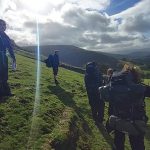The Duke of Edinburgh Award was introduced in 1956 by the Duke of Edinburgh to support the development of young people. The entry level is the Bronze Award which we offer in year 9, progressing to Silver in year 10 and Gold in year 12. However, those students joining our school in Sixth Form, we offer the chance to complete Silver and Gold Awards whether these have been achieved previously.
There are 4 sections to this award; volunteering, physical, skills and expeditions, all of which help to develop the individuals’ responsibility, commitment and contribution to society. https://www.dofe.org/about/
Please contact Ms Healey ([email protected]) in the PE Department if you are interested in signing up for the Duke of Edinburgh Award.
- LAMDA Acting (Solo and Duo)
- LAMDA Speaking in Public
- Develop more confidence in their speaking and listening skills, vocal and physical presentation skills, essential to creating and delivering both powerful speeches and performances and interpretive skills to enable students to delve into the background of a dramatic text.
The Extended Project Qualification (EPQ) is a Level 3 qualification designed to extend students’ skills and abilities required for university or a future career. In 2023, 38% of our EPQ students achieved an A* or A grade.
The EPQ allows students to lead their own projects, planning and conducting research on a topic of their choice which isn’t covered by their other qualifications. They can take inspiration from something touched on in class or something personal and unrelated to their studies. They then use this research to produce a written report and, in the case of practical projects, an artefact or a production.
We have found students really enjoy the chance to develop an area of their own personal interest. Some previous project ideas have been:
- Are school uniforms beneficial?
- Should the voting age should be lowered?
- Should animals be used for research?
- Should schools require a foreign language or physical education?
Skills developed through studying the EPQ
- Critical analysis, reflection and independence
- Decision-making and problem-solving skills
- Planning, research, analysis, synthesis, evaluation and presentation skills
Some universities offer reduced entry requirements for those students who are studying an EPQ. Achieving this qualification can also gain valuable UCAS points which support university applications.
Feedback from students
“Throughout the EPQ course the supervisor input I received enabled me to learn techniques, such as Harvard referencing, that I find myself using in my studies now, making that transition into more university styled coursework easier. In lessons, I also gained multiple skills that I incorporate into how I approach all my work now, being time management and understanding how to monitor progress through simple things like keeping a diary or timeline chart of all my work. Overall, the course has been great fun as with the teachings from my supervisor and the freedom I have been given to write about a topic I thoroughly enjoy and was willing to put time into, I have been able to produce a 5000-word project I am proud of”.
“Doing an EPQ has allowed me to develop skills that are greatly used at University. It has prepared me to do my own research and given me the opportunity to explore more into subjects I find interesting. The support I receive from my supervisor helps immensely during my project as it allows me to constantly improve my writing skills.”
Please contact Mrs Law ([email protected]) if you are interested in signing up for the Extended Project Qualification.
Core Maths is a two-year course for students who have a grade 5 or above in GCSE mathematics and want to develop their mathematical skills, knowledge and understanding to support their work in subjects like business, economics, geography, psychology, design technology and the sciences.
The course content helps improve attainment in other subjects by developing quantitative reasoning and statistical problem-solving skills.
Quantitative reasoning gives you the opportunity to use problem-solving cycles in modelling, statistics and financial mathematics in a variety of contexts. Statistical problem-solving gives you the opportunity to use spreadsheets, the statistical problem-solving cycle and more sophisticated statistical techniques to analyse authentic problems in a variety of contexts; and to work with large, real data sets.
At Trinity, we are proud to offer well-attended and engaging Subject Societies to support students’ interests and ambitions beyond the curriculum in a more informal setting. These weekly sessions are (with teacher support) run by the students, for the students and Sixth Formers play a key leadership role in running masterclasses, workshops, educational visits and areas for future sessions.
We currently run societies across 9 disciplines: Biology, Chemistry, Geography, History, Literary, Maths, Medicine, 6 Dentistry and Veterinary Science, Physics and the Social Sciences.
Any students who wish to join these should contact the relevant departments. We are open to launching any other societies which support students’ interests. Please contact the Sixth Form team if you would like to propose a new society for this academic year.




